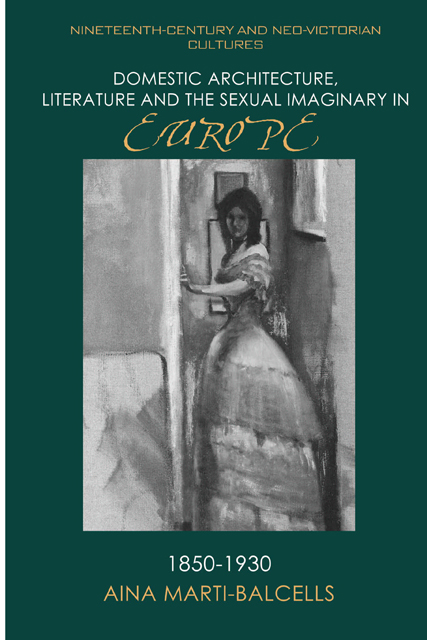Book contents
- Frontmatter
- Contents
- Series Preface
- Dedication
- Introduction
- 1 Adultery and the Subversion of Architectural Prescriptiveness in Madame Bovary and The Return of the Native
- 2 Sexual Accessibility and Exhibitionism: Glass in La Curée
- 3 Glass Dwellings and the Dissolution of Adultery in Fontane’s L’Adultera
- 4 Domestic and Sexual Circulation in Huysmans’ En ménage
- 5 Vienna: Towards a New Domestic Imaginary
- Bibliography
- Index
5 - Vienna: Towards a New Domestic Imaginary
Published online by Cambridge University Press: 02 June 2023
- Frontmatter
- Contents
- Series Preface
- Dedication
- Introduction
- 1 Adultery and the Subversion of Architectural Prescriptiveness in Madame Bovary and The Return of the Native
- 2 Sexual Accessibility and Exhibitionism: Glass in La Curée
- 3 Glass Dwellings and the Dissolution of Adultery in Fontane’s L’Adultera
- 4 Domestic and Sexual Circulation in Huysmans’ En ménage
- 5 Vienna: Towards a New Domestic Imaginary
- Bibliography
- Index
Summary
This chapter approaches Vienna as the place where the evolution of nineteenth-century domesticity culminates. Architecture and the sexual discourses being produced in early twentieth-century Vienna were significant as they articulated a new domestic culture, which is found at the beginning of a new middle-class domesticity. The cultural production of turn of the century Vienna illustrates the final transformation of a nineteenth-century domestic discourse into a massive European middle-class culture. It also shows the end of the ‘bürgerliche Ordnung’ (bourgeois order) (Vorbrugg 2002: 147) as articulated in the nineteenth century. Different issues concerning the domestic were explored among Viennese architects, doctors and writers. The expression of female sexuality, the sexualisation of the nuclear family, the articulation of home as a sexual space, the introduction of open spaces and an architecture that played with notions of familiarity and unfamiliarity were some of the topics present at the turn of the century. In this context, the previous chapters have shown the progressive modifications of the domestic experience during the second part of the nineteenth century, while the cultural milieu of Vienna at the beginning of the twentieth century meant the consolidation of a series of changes in the domestic sphere that slightly shifted away from the logic of domestic discourses that originated in the eighteenth century.
Those progressive modifications of the domestic were a determinant for the eventual redefinition of the actual concept of domesticity. Such a redefinition was finally pushed by the following factors: the formulation of the Freudian unconscious, the representations of an erotic private sphere and the opening of sexual and spatial boundaries. In Vienna the sexual discourse articulated by psychoanalysis signified a real disturbance of a concept of domesticity based mainly on stable limits. Freud’s definition of both the unconscious and perversion introduced the continuity between normal and perverse sexuality and abolished the clear opposition between them. Although part of Freud’s thought was based on an already existent medical tradition, which included Auguste A. Tardieu (1818–1879), Richard von Krafft-Ebing (1840–1902) and Jean-Martin Charcot (1825–1893) among others, the novelty of his discourse resided in the way in which perversion was being narrated, and the fact that his discourse was widely and commonly used. Far from using specialised and obscure terms, psychoanalysis presented a narrative form in which ideas and terminology reached far beyond the medical field.
- Type
- Chapter
- Information
- Publisher: Edinburgh University PressPrint publication year: 2022



